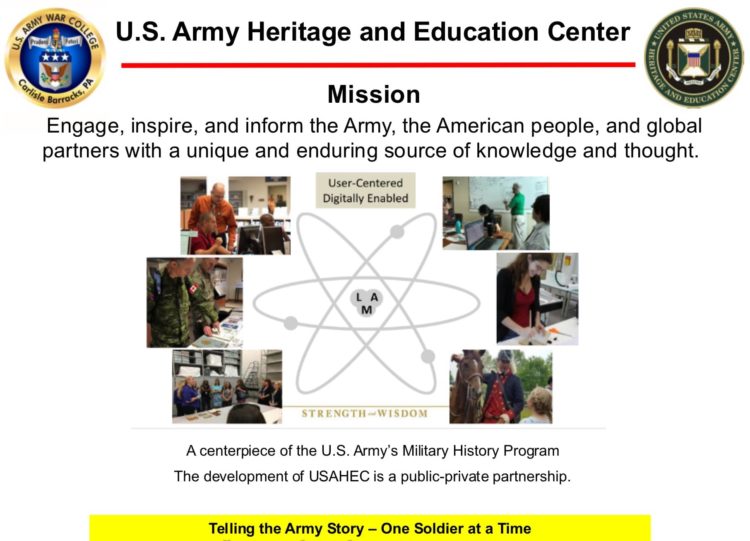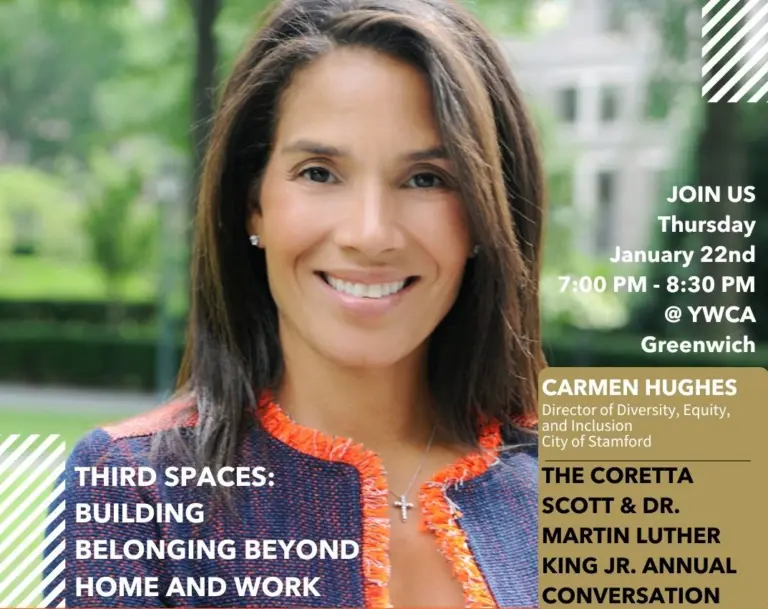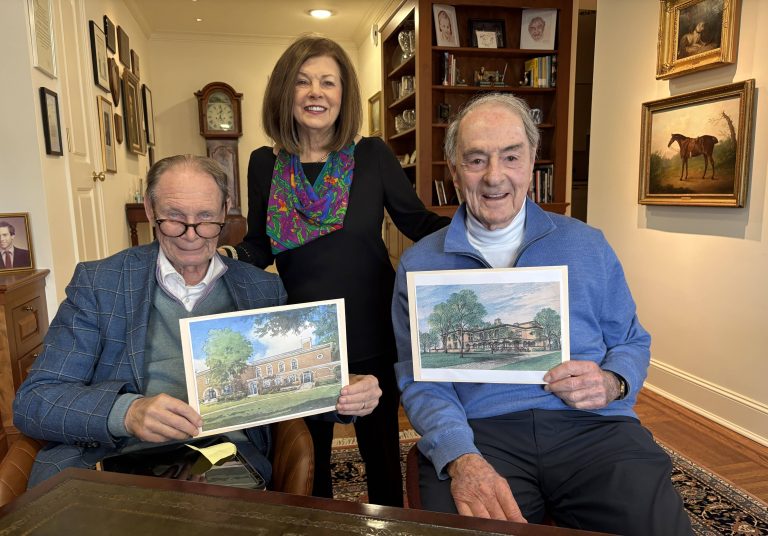
By Av Rivel
At the August 17 meeting of the Retired Men’s Association, Hollister Sturges introduced the speaker, Mike Perry, President and CEO of the Army Heritage Center Foundation in Carlisle, Pennsylvania. The Foundation is the non-profit “friend group” for the U.S. Army Heritage and Education Center (USAHEC), a component of the U.S. Army War College. USAHEC is the U.S. Army’s premiere research facility dedicated to the preservation of the Army’s unofficial history.
The preservation of our veterans’ memories of service remains an important role for our libraries, historical societies, and archival facilities. Yet, today’s growing digital environment, while increasing the volume of materials being recorded, presents significant challenges for those who wish to see these materials saved for future generations. Mike Perry presented what has changed over the past several decades that has increased the challenges faced for preservationists and the new opportunities the growing digital environment provides.
But first, his story. The son of a military family, he served in WWII and Korea, was commandant of the first mixed-gender training facility in the US Army, and taught at West Point and the US Army War College.
Why is it important to save the history of the men and women who fought in the military? It is important to inform vets, their families and the general population of the stories of the people who fought. Vets often do not share their experiences with family and friends. Before the 1990’s all official records were on paper. Personal records such as letters, diaries and accounts were all on paper as well. This includes photos and films and some audio records. Paper records, if properly stored will last longer than the people who generated them.
Post 1990s, the digital age, there are more records but they are in multiple formats on phones, thumb drives, computers and in the cloud. Some of the technology used to record these records is already obsolete and archiving them presents a problem. There are also multiple organizations collecting data. Museums of all sorts have been established, such as, local, military, and colleges and universities. Perry then gave the RMA a virtual tour of the Heritage Center in Carlisle PA. A lively RMA Q&A followed.
For those interested in viewing the full presentation, go to the RMA website and click on the video at https://vimeo.com/740542354.
The RMA’s upcoming presentation “Straighten Up and Fly Right, The Life and Music of Nat King Cole” by Will Friedwald is scheduled for 11 AM on Wednesday, August 31. Music critic Will Friedwald will speak on the life and career of Nat King Cole, one of the most popular American musicians of the 20th century, remembered today as both a pianist and singer. In his latest book, Straighten Up and Fly Right: The Life and Music of Nat King Cole, Friedwald offers a new take on this fascinating musician, framing him first as a bandleader and then as a star. In Cole’s early phase, Friedwald explains, his primary task of keeping his trio going was just as much of a focus for him as his own playing and singing, always a collective or group performance. In the second act, Cole’s collaborators were more likely to be arranger-conductors like Nelson Riddle and Gordon Jenkins, rather than his sidemen on bass and guitar. In the first act, his sidemen were equals, in the second phase, his collaborators were tasked exclusively with putting the focus on him, making him sound good, while being largely invisible themselves.
Friedwald will discuss how this duality appears over and over again in Cole’s life and career: jazz vs. pop, solo vs. trio, piano vs. voice, the rhythm numbers vs. the ballads, the funny songs vs. songs of love and loss, Cole as an advocate for the Great American Songbook vs. Cole the intrepid explorer of other options: world music, rhythm & blues, country & western.
Friedwald has written about music for The Wall Street Journal and was the jazz critic for The New York Sun. He is the author of nine books, including A Biographical Guide to the Great Jazz and Pop Singers; Stardust Melodies: The Biography of Twelve of America’s Most Popular Songs; Jazz Singing: America’s Great Voices from Bessie Smith to Bebop and Beyond; Sinatra! The Song Is You; and Tony Bennett: The Good Life. He has written liner notes for nearly five hundred compact discs, for which he has received eight Grammy nominations. He has also written for Vanity Fair, The Village Voice, Entertainment Weekly, American Heritage, and The New York Times, among other publications.
There will be no RMA meeting at the First Presbyterian Church August 31.
To stream Mr. Friedwald’s presentation at 11 AM on Wednesday, August 31, click here (https://bit.ly/30IBj21). This presentation will also be available on local public access TV Channels, Verizon FIOS channel 24 and Optimum (Cablevision) channel 79.
RMA speaker presentations are presented as a community service at no cost to in-person or Zoom attendees. The RMA urges all eligible individuals to consider becoming a member of our great organization, and thereby enjoy all the available fellowship, volunteer, and community service opportunities which the RMA offers to its members. For further information, go to www.greenwichrma.org, or contact our membership chairman (mailto:members@greenwichrma.org).




